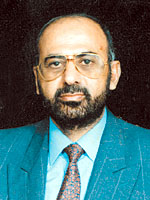
Mr. Hawash of Baath Party: appointing directors for the local councils and Local Authority will considerably affect granting local areas the required utility. [Archives:2001/06/Law & Diplomacy]
February 5 2001

Vice Secretary of the Arab, National, Socialist, Baath Party
The establishment of Local Authorities has been the objective of the masses since the revolution broke out. It was and is still given top priority by the nationalist forces in the country. Calls to expand the power of this authority will continue to be given until they are fully realized. The local authority is bound to face many obstacles. However, the more we persist, the more we push it forward. It is clear that the Local Authority can never be a success unless just and fair elections are held where people come to shape their destiny. Now the Local Authority has been given more scope in the legislative sphere. A premium is then to be placed on the unwavering and devoted will and earnest implementation of this legislation. Otherwise, this legislation and these councils will have no meaning. Rather they will be another avenue for more central control, corruption and chaos under the umbrella of the authority and local councils.
The crucial point of the whole process is the peoples role in monitoring and active interaction with the event so as to improve, rectify and expand its utility. Despite the pitfalls and setbacks of the previously established Cooperative Councils, it was a good experience that could be the basis for maintaining momentum. These councils had made some achievements, especially in the countryside in terms of building schools and repairing roads.
The duties and authorities of the Local Authority and its administrative units are all defined in the Local Authority Law and its executive by law, starting from monitoring the implementation of general polices and effective laws in all fields; evaluating performance to the extent of holding officials accountable and passing votes of no confidence; endorsing projects in units; collecting local revenues; following up implementation of development projects and construction plans; developing the marine resources; ensuring security and stability, … etc. As a matter of fact, these are major and manifold authorities whose success hinges on the seriousness of the political as well as the popular will to hold fast to their rights in choosing the qualified and really competent representative to shoulder these responsibilities.
It is unquestionable that appointing directors for the local councils and Local Authority will considerably influence granting local areas the required authorities. The nightmare of centralization is then bound to shroud over the work of local authorities. This control is enhanced by the executive observation of Local Administration Ministry on the administrative units, a major limitation of the law which we have constantly been calling for reconsideration to embrace dimensions and substances of ruling and local authority.
Personally speaking, I do not trust the international organizations monitoring these elections which in my view work to serve some foreign interests. Earlier experience in many Arab and foreign countries proved that.
Regarding the constitutional amendments, we think that the formulation of the unity constitution and the amendments that followed were good, safeguarding interests of forces which participated in the dialogue; the two authorities of the then two parts of Yemen (YSP & PGC), the ruling alliance (YSP & PGC), as well as the three major parties (PGC, YSP, YCRP), and the two ruling alliances (PGC & YCRP) after the war of secession. Hence, amending the constitution has been and is still holding the interest of most of the political forces within the country on condition that these amendments be the result of extensive and broad dialogue with all the political forces in the arena. If this is done, it is certain that the amendments will ensure more support for the people. Amendments should not at all be selected and adapted to serve some short-run goals and limited interests. Therefore, we did not approve of the techniques applied in formulating these amendments as it covered quite an important and large section in the arena. Irrespective of our stand on the articles amended, what is important now is that this technique should not be the basis for more similar maneuvers in the future. Moreover, holding local councils elections simultaneously with the referendum on the constitutional amendments is a clear legal violation as local councils legitimacy first requires approval of the amendments. Therefore, we were supporting the stance of the Supreme Coordination Council of Opposition Parties in an attempt to establish clear and correct fundamentals ensuring larger democratic spirit for the political forces in the arena.
The Supreme Election Committee (SEC) is originally formed of two parties. Events have come to prove that neutrality is not at all possible. Every member of the committee is serving the interests of his party. The contentious point lies in the law that allows for the members resignation from the party after being appointed. However, this resignation is only an eye wash for he continues to serve his party under cover. I see that re-forming the SEC on a partisan basis, as it was in 1993, is the proper step to ensure more neutrality and monitoring. Measures in the SEC now are being taken by two parties with a marginal role of a third party. As a result neutrality remains a far cry.
Supreme Coordination Council of the Opposition Parties always seeks to promote coordination between the opposition parties to the best level. It is actually making slow but commendable progress in this context. In the upcoming elections the council declared running for elections in districts within a unified list. The council have so far made it in some districts. However, in other districts its efforts came through. We will put keep our fingers crossed for the council to overcome the stage of coordination to do something beyond that, especially after issuing its struggle program during the previous year making its vision and objectives clearer, more transparent and more convincing.
——
[archive-e:06-v:2001-y:2001-d:2001-02-05-p:./2001/iss06/l&d.htm]


